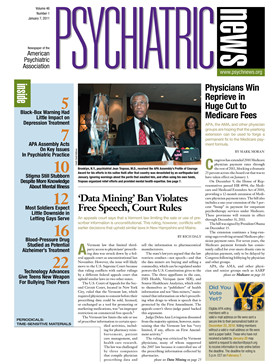A growing body of evidence points to a cross-sectional link between obesity and affective disorders.
Furthermore, a prospective study of some 5,000 people conducted by Finnish researchers over a 19-year period and published in the August 2009 British Journal of Psychiatry suggested that anxiety and depression tend to precede and contribute to the development of obesity, not vice versa.
But if anxiety and depression can lead to obesity, how does it happen? By prompting people to overeat to relieve their anxious or depressed states? A new study suggests that such a hypothesis may not be correct. It appears instead that it is the psychotropic medications that anxious and depressed people take—not the anxiety and depression per se—that increase their risk of obesity.
The lead author of the new study, the findings of which are published in the November 2010 Journal of Psychiatric Research, was Jasper Smits, Ph.D., director of the Anxiety and Treatment Program at Southern Methodist University in Dallas.
Smits and his colleagues set out to determine if mood and anxiety disorders might contribute to the development of obesity through the use of psychotropic medications. They used data from a nationally representative survey of Canadians from all 10 provinces aged 15 or older called the Canadian Community Health Survey Cycle 1.2, which included some 37,000 subjects.
The surveyed subjects had been evaluated mostly face to face, the rest by phone, for a number of DSM-IV mood or anxiety disorders, use of psychotropic medications, level of physical activity, history of medical illness, and body mass index (BMI). A person with a BMI of 30 or more was considered obese.
In analyzing the data, and taking some possibly confounding variables such as socioeconomic factors, physical illness, and physical activity into consideration, the researchers identified three key findings.
•
The relationship between mood disorders and obesity and between anxiety disorders and obesity was significant.
•
Mood and anxiety disorders were significantly related to the use of antidepressant and antipsychotic medications, but not to anxiolytics, hypnotics, or mood stabilizers.
•
Antidepressants and antipsychotics emerged as significant predictors of obesity. The use of these two classes of medications accounted for 86 percent of the relationship between mood disorders and obesity and 32 percent of the relationship between anxiety disorders and obesity.
So putting these findings together, the researchers said that they “demonstrated that the increased odds of obesity in mood disorders were fully mediated by medication use, whereas the relationship between anxiety disorder diagnosis and obesity was partially mediated by medication use.”
“It is probably true that some of the association between mood or anxiety disorders and obesity is mediated by medication,” Gregory Simon, M.D., told Psychiatric News, “but we need to be cautious in interpreting these data.” Simon, a researcher at the University of Washington Center for Health Studies–Group Health, is also an expert on the depression-obesity link.
“Receipt of an antidepressant or antipsychotic medication is probably a marker for a more severe mood or anxiety disorder,” he explained, “so the analyses indicating that medication use explained away most of the relationship between mood/anxiety disorder and obesity may not indicate a causal relationship. It may instead indicate that obesity is more strongly associated with more severe depression or anxiety. Furthermore, people with mood or anxiety disorders who are also obese are probably more likely to see doctors and therefore more likely to be treated with antidepressant or antipsychotic medications. Again, this would create a relationship that was not causal.”
In any event, assuming that the use of antidepressants or antipsychotics for anxiety or depression sometimes leads to obesity, what are the clinical implications? “The use of psychotropic medication is often indicated for these psychiatric disorders, and therefore termination and switching to nonpharmacological treatments is not always an option,” Smits and his colleagues said in their research report. “One alternative is to augment pharmacological interventions for mood and anxiety disorders with strategies aimed at reducing weight gain. A growing body of work points to behavioral weight-management programs as efficacious adjuncts to antipsychotic treatments.”
The study was funded by the National Institutes of Health, the Canadian Institutes of Health Research, a Manitoba Health Research Council Chair Award, and Schering-Plough/Merck.
An abstract of “Psychotropic Medication Use Mediates the Relationship Between Mood and Anxiety Disorders and Obesity: Findings From a Nationally Representative Sample” can be accessed at <www.sciencedirect.com/science/journal/00223956> under the November issue. 
